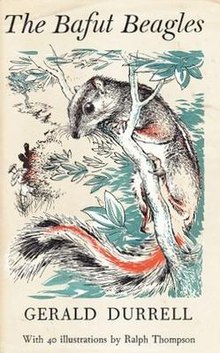The young(ish) Gerald Durrell is on an animal-collecting expedition in the Cameroons. The Fon is the local...well, I suppose he's the local king. In any case, he's a man of immense charm and presence with a huge capacity for joy, dance, and alcohol. (His name (though it isn't mentioned in the book) was Achirimbi II.)
'In order to hunt for the various members of the Bafut fauna I employed, besides the four hunters the Fon had supplied, a pack of six thin, ungainly mongrels, who, their owners assured me, were the finest hunting dogs in West Africa. I called this untidy ensemble of men and dogs the Bafut Beagles. Although the hunters did not understand the meaning of the title they grew extremely proud of it, and on one occasion I heard a hunter, when arguing with a member of the local population, proclaim in shrill and indignant tones, 'You no go shout at me like dat, ma friend! You no savvy day I be de Bafut Beagle?'
As must be already clear, the story of The Bafut Beagles is full of energy, affection and mirth.
The book is full of animals, too. Here's a Golden Cat:
'Glaring at me was a face of such beauty that I gasped. The fur was short, smooth, and the rich golden-brown of wild honey. The pointed ears were flattened close to the skull, and the upper lip was drawn back in a series of fine ripples from the milk-white teeth and pink gums. But it was the eyes I noticed more than anything else...They were green, the green of leaves under ice, and they glittered like mica in the evening sun.
As must be clear from that passage, it's all gloriously well written - and a complete treat from beginning to end, too.

Word To Use Today: beagle. This word has been around since the 1400s, but no one is sure where it came from. It might come from the French begueule, meaning open throat (beugler means to bellow) or from the Gaelic beag, small (the first beagles were only twenty centimetres tall), or from the German word begele, to scold.
No comments:
Post a Comment
All comments are very welcome, but please make them suitable for The Word Den's family audience.